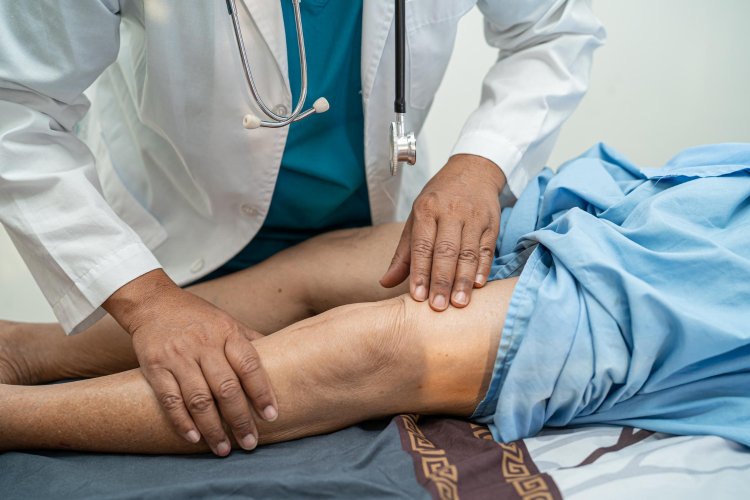Pain-Free Steps: How Knee Replacement Surgery Changes Lives
Total knee replacement (TKR) surgery, also known as knee arthroplasty, is a widely performed and highly effective orthopedic procedure. It aims to relieve pain and restore function in patients suffering from severe knee joint damage, often due to conditions such as osteoarthritis, rheumatoid arthritis, or post-traumatic arthritis. This surgery involves the removal of damaged cartilage and bone, followed by the insertion of prosthetic components to recreate the knee joint. With advancements in medical technology and surgical techniques, TKR has become a reliable solution for improving the quality of life for many patients.

Indications for Surgery
The primary indications for total knee replacement surgery include:
Severe Pain: Chronic knee pain that persists despite conservative treatments such as medications, physical therapy, and injections.
Functional Limitations: Difficulty in performing daily activities, including walking, climbing stairs, and standing up from a seated position.
Deformity: Presence of knee deformities such as bowing (varus) or knock-knees (valgus).
Instability: Knee instability or giving way, which can increase the risk of falls and further injury.
Failure of Other Treatments: Inadequate response to non-surgical interventions like weight loss, lifestyle modifications, and joint injections.
Preoperative Preparation
Successful outcomes of TKR are heavily dependent on thorough preoperative preparation, which involves:
Medical Evaluation: Comprehensive assessment including medical history, physical examination, and diagnostic tests such as blood work and imaging (X-rays, MRI).
Optimization of Health: Management of coexisting medical conditions like diabetes, hypertension, and cardiovascular diseases to minimize surgical risks.
Preoperative Education: Informing patients about the surgery, expected outcomes, rehabilitation process, and potential risks.
Physical Therapy: Preoperative exercises to strengthen the muscles around the knee, improving flexibility and range of motion.
Lifestyle Modifications: Encouraging weight loss if necessary, cessation of smoking, and a balanced diet to enhance recovery.
Surgical Procedure
The TKR procedure typically follows these steps:
Anesthesia: Administered either as general anesthesia, where the patient is unconscious, or regional anesthesia (spinal or epidural), numbing the lower body.
Incision: A surgical cut, usually 6-10 inches long, is made over the knee to access the joint.
Preparation of the Joint: The surgeon removes the damaged cartilage and a small amount of bone from the femur, tibia, and patella.
Implantation of Prosthesis: The prosthetic components are then positioned. These components are:
- Femoral Component: Made of metal, attached to the end of the femur.
- Tibial Component: Made of metal and plastic, attached to the top of the tibia.
- Patellar Component: A plastic button that replaces the undersurface of the patella.
Closure: The surgeon closes the incision with sutures or staples and bandages the knee.
Postoperative Care and Rehabilitation
Postoperative care is essential for a successful recovery and involves:
Immediate Postoperative Care: Monitoring in a recovery room, managing pain with medications, and preventing complications such as blood clots using anticoagulants and compression devices.
Early Mobilization: Patients are encouraged to begin moving the knee and walking with assistive devices like a walker or crutches within 24 hours post-surgery.
Physical Therapy: A structured rehabilitation program focusing on exercises to improve strength, flexibility, and range of motion. This typically starts in the hospital and continues for several weeks to months.
Wound Care: Keeping the surgical site clean and dry, monitoring for signs of infection, and attending follow-up appointments with the surgeon.
Pain Management: Ongoing pain control through medications, ice therapy, and elevation of the leg to reduce swelling.
Outcomes and Benefits
The outcomes of total knee replacement surgery are generally highly positive:
Pain Relief: Most patients experience substantial or complete relief from chronic knee pain.
Improved Function: Enhanced ability to perform daily activities and engage in low-impact exercises.
Longevity of Prosthesis: Modern prosthetic components are designed to last 15-20 years or more, depending on activity levels and adherence to postoperative care.
Quality of Life: Overall improvement in quality of life, with increased mobility and independence.
Risks and Complications
While TKR is a successful surgery for many, it carries potential risks:
Infection: Can occur at the surgical site or deep around the prosthesis.
Blood Clots: Deep vein thrombosis (DVT) or pulmonary embolism (PE) are risks, managed with anticoagulants and compression devices.
Implant Issues: Loosening, wear, or dislocation of the prosthetic components.
Nerve Damage: Rare, but possible injury to the nerves around the knee.
Stiffness: Limited range of motion post-surgery, requiring further intervention or manipulation under anesthesia.
In conclusion, total knee replacement surgery is a transformative intervention for individuals suffering from severe knee joint damage. With meticulous preoperative planning, skilled surgical techniques, and diligent postoperative care, patients can achieve remarkable improvements in pain relief, mobility, and overall quality of life. As medical advancements continue to evolve, the success rates and outcomes of TKR are expected to further improve, providing lasting benefits for patients worldwide.
Disclaimer: The information provided in this article is for educational purposes only and should not be considered medical advice. If you have any health concerns or are experiencing symptoms, it is important to consult with a healthcare professional, such as a doctor or clinic, for proper diagnosis and treatment. Always seek the advice of your doctor or other qualified health provider with any questions you may have regarding a medical condition. Do not disregard professional medical advice or delay in seeking it because of something you have read in this article.
#TKR #KneeSurgery #Health #Orthopedics #SurgeryPreparation #Rehabilitation #MedicalAdvice #PainRelief #QualityOfLife #SurgicalRisks
What's Your Reaction?





















